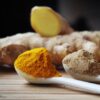Is your baby unsettled even after eating and a peaceful sleep… and a big cuddle and play …AND a nappy change? You cannot figure out what is going on…. Well it could be your diet. Everything we consume is absorbed into our blood stream and therefore your breastmilk which goes directly to your baby.
The usual suspects…
Unfortunately, that means that your morning pick me up caffeine hit can leave your little one feeling cranky and irritable as their little systems can’t handle caffeine like yours can.
There are other foods that cause irritability in similar ways such as chocolate or refined carbohydrate foods, processed foods and foods heavy in preservatives and colourings.
Some professionals do not recommend alcohol to be consumed at all while breastfeeding as the effects are not fully understood, and others have a more lenient stance for small non regular amounts. If you feel unsure avoid alcohol.
Certain spices, such as garlic, curry, cumin and capsicum can be to blame for a fussy baby as they can change the sweet simple taste of your milk and upset your little ones sensitive tummy.
The unusual suspects…
Fruit and vegetables are supposed to be healthy right? While citrus fruits are high in vitamin C, they are known to irritate your babies GI tract which has still not yet fully developed, leading to fussiness and even nappy rash in some babies.
Eating broccoli and tomatoes can lead to irritable babies due to the very high salicylate levels. Salicylates are a natural occurring chemical found in plants – it is actually the plants natural pesticide, and today our babies and children are becoming more and more sensitive to them, check out the fedup website for more information on salicylates.
Six years ago, medical researchers discovered that tartrazine (code 102) the yellow colouring, can cause irritability, restlessness, inattention, difficulty settling to sleep and frequent night waking (Rowe KS and Rowe KL 1994). The more you have, the more likely you are to be affected. Young children, and especially babies, are the most vulnerable to the effects of food additives because, dose for weight, they take in greater amounts than adults. Food additives can be transmitted through breastmilk (Clarke L et al 1996).
Tartrazine is present in cakes, cake mixes, donuts, muffins, snack cakes, ice-cream, cookies and crackers, drink mixes, lemonade, pudding mix, boxed meals, rice and pasta dishes, cheesecake, butterscotch candy, jelly and chips.
Additives have been associated with problems including stomach-aches, bloating, diarrhoea, reflux , itchy skin rashes, migraines, headaches, asthma, depression, anxiety, unexplained tiredness, forgetfulness, hyperactivity and recurrent mouth ulcers. Eating a diet as natural as possible and avoiding packaged foods decreases you and your babies exposure to additives.
, itchy skin rashes, migraines, headaches, asthma, depression, anxiety, unexplained tiredness, forgetfulness, hyperactivity and recurrent mouth ulcers. Eating a diet as natural as possible and avoiding packaged foods decreases you and your babies exposure to additives.
Ruth works with pregnant women, breastfeeding mothers and young and old children all the time to identify and assess suspected food allergies and intolerances. You and your family don’t need to suffer, call Ruth and her team to see how they can help you!





